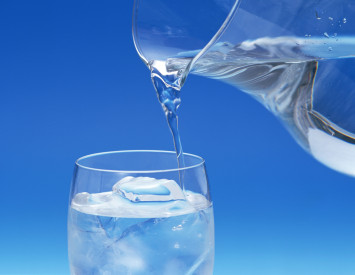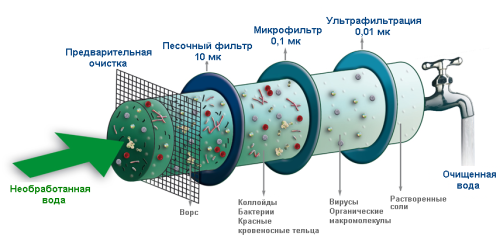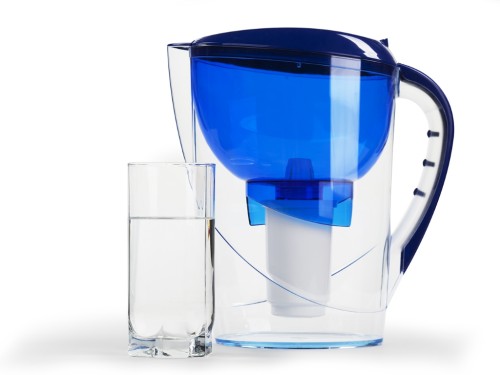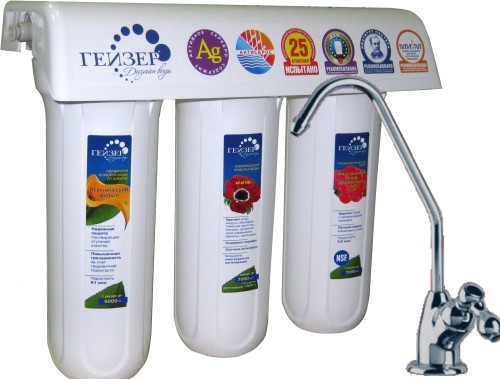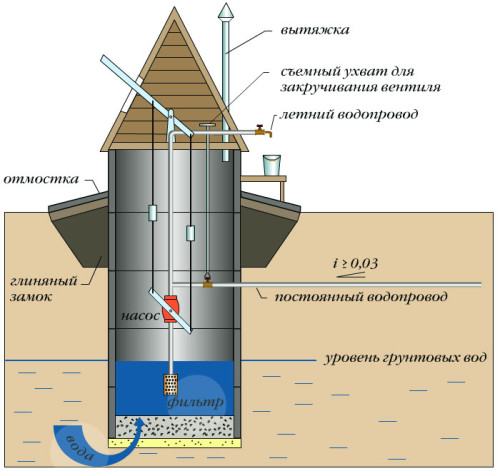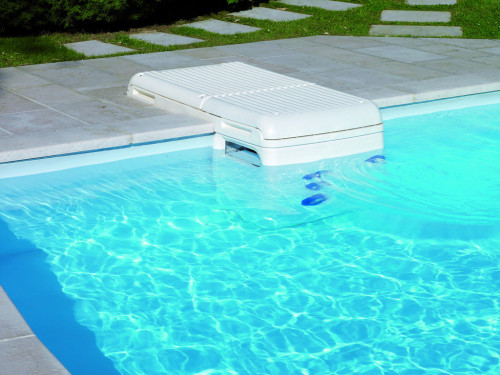In modern conditions, the task of achieving the desired quality of water is of particular relevance. She can enter the final consumer from various sources. They are artesian wells, mountainous streams, surface water, as well as sea water after desalination processing. At the same time, it is necessary that it be transparent and smell, does not contain pathogens, as well as impurities, suspension of solid particles and dissolved substances that cause the appearance of the sediment. In addition, the content in water for drinking, household needs and industrial purpose should be monitored. Before submitting it, preparatory processing is required, including filtration according to the purpose of the water.
Content
Water filtration methods
Filters are used in the following cases:
- for demineralization, as well as neutralization of pollution;
- for clarification from silt and sand of water - when it is foam from rivers and lakes;
- for bringing tap water to the acceptable quality;
- for water, which worsened its characteristics in the process of processing and use;
- for final processing before returning to the natural cycle.
Using water filtration, various suspended particles of garbage, leaves, clay and sand, rust and slag are removed to protect the water distribution network (pipes, plumbing equipment and locking reinforcement) from clogging and corrosion, the appearance of deposits in the form of an insoluble raid.
In modern systems of water treatment and water supply to ensure the purity and safety of water, complex cleaning is carried out:
- passing through water filtration systems in the form of special cleansing modules containing the filtering layer (gravel and crushed stone, sand, anthracite, etc.) - sometimes in combination with biological filtration (using anaerobic bacteria, which are grown on gravel);
- through cassette filters, as well as mechanical filters with mesh elements.
In addition to mechanical cleaning, the following water filtration methods also exist:
- Chemical - their principle of action is based on chemical reactions.
Chemical reagents are added to the water to remove contaminants by decomposing, neutralization, or converting and delayed by a filter.
Chemical filtration of water effectively softens water, normalizes its acidity, as well as the content of iron, various salts, manganese, free chlorine, organic compounds, bacterial impurities. This method is not suitable for drinking water.
- Physical methods:
- the reverse osmosis method is using polymer membrane filters with the smallest holes that pass only water and oxygen molecules;
- ultraviolet radiation - effectively sterilizes water, killing pathogenic bacteria;
- water heat sans - hardness salts are destroyed by boiling and precipitate.
- Physico-chemical methods combine the advantages of physical and chemical methods:
- using the flotation effect - for filtering wastewater through the liquid mass of effluents, gas is passed, the formed foam with pollution is removed;
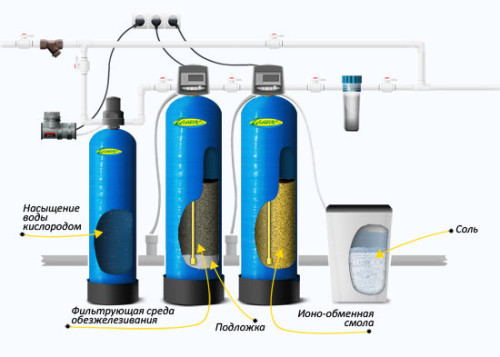
- the Ion exchange method is filtering through the backfill in the form of ion exchange resin. Due to the chemical reaction, the structure of the water changes, it is softened - hardness salts fall into the precipitate and are filtered mechanically. This method is not suitable for drinking water;
- with the help of electrocoagulation - under the influence of electrolysis, settling of colloidal particles and suspension occurs.
Filtering equipment
In modern conditions, multi -layer filters are increasingly used to purify water, consisting of several layers with certain functions, while water is passed sequentially through the entire thickness of the filter layers. Such cleaning significantly enhances the speed and efficiency of water treatment.
Today, the use of water filtering systems for home and apartment is no longer a luxury. In a modern environmental situation, experts strongly recommend using home filters to clean drinking water.
Home filters
In order to decide which system of water filtration to buy, first of all, it is necessary to order an analysis of water from the well, well or water supply - to determine the degree of saturation with impurities. Based on the results obtained, you can choose filter installations to remove various impurities, giving drinking water cleanliness and safety, as well as to protect household appliances and plumbing equipment from pollution, scale deposits and subsequent breakdowns.
A variety of filters for cleaning drinking water are presented on sale:
- filters are small and mobile filters that provide protection against certain types of pollution. Differ in low price;
- flot filters, installed on separate cranes, as well as installed under the sink - will provide needs for purified water for several people. The quality of such cleaning and the resource of cartridges is higher than in dump filters;
- complex water filtering systems for home are more expensive and complex systems that provide filtering up to 99% of pollution. Among them, manufacturers offer the installation of multi -purpose water purification by the reverse osmosis - for example, the ATOLL water filtration system.
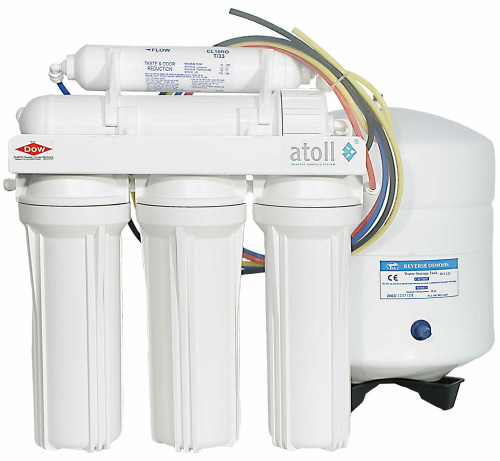
Such filtration includes:
- preliminary preparation of water in the form of water purification from chlorine, pesticides and organics, mechanical contaminants up to 1 μA;
- passing through a semi -permanent polymer membrane of thin cleaning;
- final filtering through a coal filter.
Flot filters on a separate crane can be installed in any house. These systems are distinguished by a successful ratio of functionality and prices, significantly improve the quality of drinking water, effectively purify it of a variety of contaminants. The geover -cleaning method implemented in the water filtering systems, the natural cleaning method allows you to maintain a natural degree of mineralization in soft water, and hard to soften it effectively. Currently, this method is used by many manufacturers.
Filters for wells
For well water, natural bottom filtering of drinking water is traditionally used using a layer of non -toxic and insoluble materials (gravel, gravel, sand, pebbles, shungite, jadeite, etc.) - they are laid on the bottom of the well during construction.
In addition, the bottom soil soil filters made of geotextiles (polypropylene fibers) and cassette filters are widely used that can cope with such types of pushes and a variety of chemical impurities.
Water filtering in the pool
The specificity of the pool is such that cleansing is required of small garbage, bacteria and microorganisms, as well as algae that cause flowering of water, organic substances. To maintain the level of the sanitary and hygienic state of the pool, it must be equipped with a filtration system. Water purification in the pool of garbage is carried out using filters through which water is gradually passed. At the same time, water circulation supports the pump with a pre -cleaning filter in the form of a basket with large cells for garbage detention.
The following types of filters are used for pools:
- sanding - with a filter pillow of sand without clay additives. The efficiency of garbage filtration, as well as filtering load, depends on its granularity. Such filters use quartz sand (granularity of 0, 45-0.55 mm), as well as glass sand, is recommended. The presence of six or four-position tap allows you to rinse sand without replacing it. When buying a sand filter, you should pay attention to the availability of replaceable cranes on sale;

- multilayer filters - in the form of two or three layers of mineral rafting of various grainness, which decreases in the direction of movement of the water flow. First, large garbage is filtered, and then smaller;
- cartridge - in a plastic or metal case there is a petal shift cartridge, which is required to be changed as it is contaminated;
- combined filters - for disinfecting and enriching water as part of water filtration systems in the pool, various installations are used to ozone and ionize water containing cartridges with bromine, chlorine or iodine. Such systems, depending on the structure, can simultaneously perform several functions - disinfection, enrichment and filtration.
For small -sized home pools (up to 10 m 3) It is allowed to use cartridge filters, with an increase in the volume of water, it is recommended to use a sand filter, as well as water disinfection methods.
